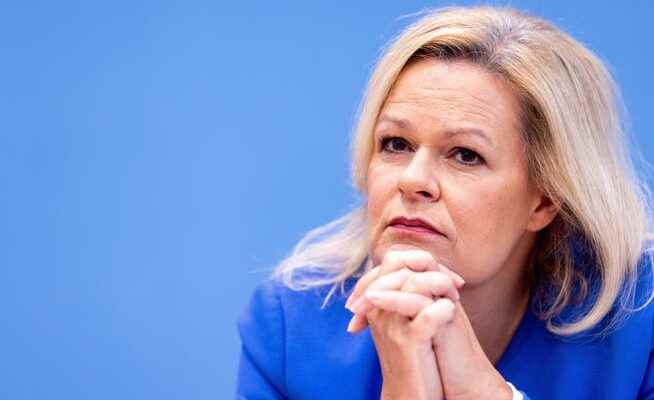The traffic light coalition wants to facilitate naturalization in Germany. The Union positions itself clearly against the plans – representatives of the co-governing FDP are also skeptical.
She forges a plan to make foreigners German citizens more quickly: Interior Minister Nancy Faeser.
She wants nothing less than a paradigm shift, wrote Nancy Faeser in a guest post for the on Sunday «Daily mirror»: The social democrat is planning an amendment to citizenship law. In the future, people should no longer be forced to give up their previous citizenship. In addition, the interior minister’s plans provide for foreigners to be able to apply for a German passport after five instead of eight years.
Children of foreign parents who were born in Germany should also automatically receive German citizenship as soon as one parent has been living legally in Germany for more than five years and has an unlimited right of residence. Ultimately, Faeser wants to give preference to foreigners from the so-called guest worker generation: the immigrants who came to Germany from southern Europe and Turkey in the 1950s and 1960s should be granted citizenship without a naturalization test or written proof of language proficiency.
Politicians from the CDU and CSU have already announced opposition to the planned law. That was expectable. But the FDP is also publicly opposing its own coalition partner. Liberal Secretary-General Bijan Djir-Sarai told the «Rheinische Post» on Sunday: “Now is not the time to simplify citizenship law. There will be no devaluation of German citizenship with the FDP. It’s tough, but necessary.”
The Union announces resistance
Djir-Sarai justifies his refusal with failure to combat illegal migration. The government should therefore not take the second step before the first. In the question of naturalization, the FDP is not only against the Minister of the Interior, but also against the Federal Chancellor.
Because Olaf Scholz supports Faeser’s reform plans. In its published Friday video podcast he remembered naturalization ceremonies he had attended as mayor of Hamburg. “Germany needs better rules for the naturalization of all these great women and men,” the chancellor concluded from his experiences.
On the other hand, the CDU leader Friedrich Merz warned on Sunday evening in the program “Report from Berlin” of an impending immigration into the social systems. According to Merz, dual citizenship should remain the exception and not become the norm. The head of the CSU state group, Alexander Dobrindt, chose even clearer words. To the “Picture” he said on Friday: “Bargaining German citizenship does not promote integration, but has the exact opposite purpose and will trigger additional pull effects in illegal migration.”
More than ten million people would be affected by the reform
It is therefore highly doubtful that the planned reform of citizenship law will come about as Faeser outlined it in the “Tagesspiegel”. In order to get the law through the Bundestag, the SPD and the Greens have to convince the FDP. And even once that hurdle is cleared, there’s a good chance plans will be further watered down. Because in the Bundesrat, the CDU and CSU could block the reform and bring about further changes. The Union has already succeeded in doing this with the recently adopted draft law on citizen income.
But even small changes in citizenship law could potentially affect a large number of people: around 5.7 million foreigners have been living in Germany for more than eight years. In total there are 11.4 million. Last year, 131,600 people were naturalized in Germany. A quarter of those who were naturalized came from other EU countries; with 19,100 naturalized people, Syria was the most common country of origin for those who received a German passport in 2021.
